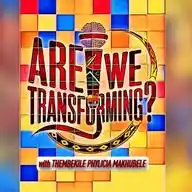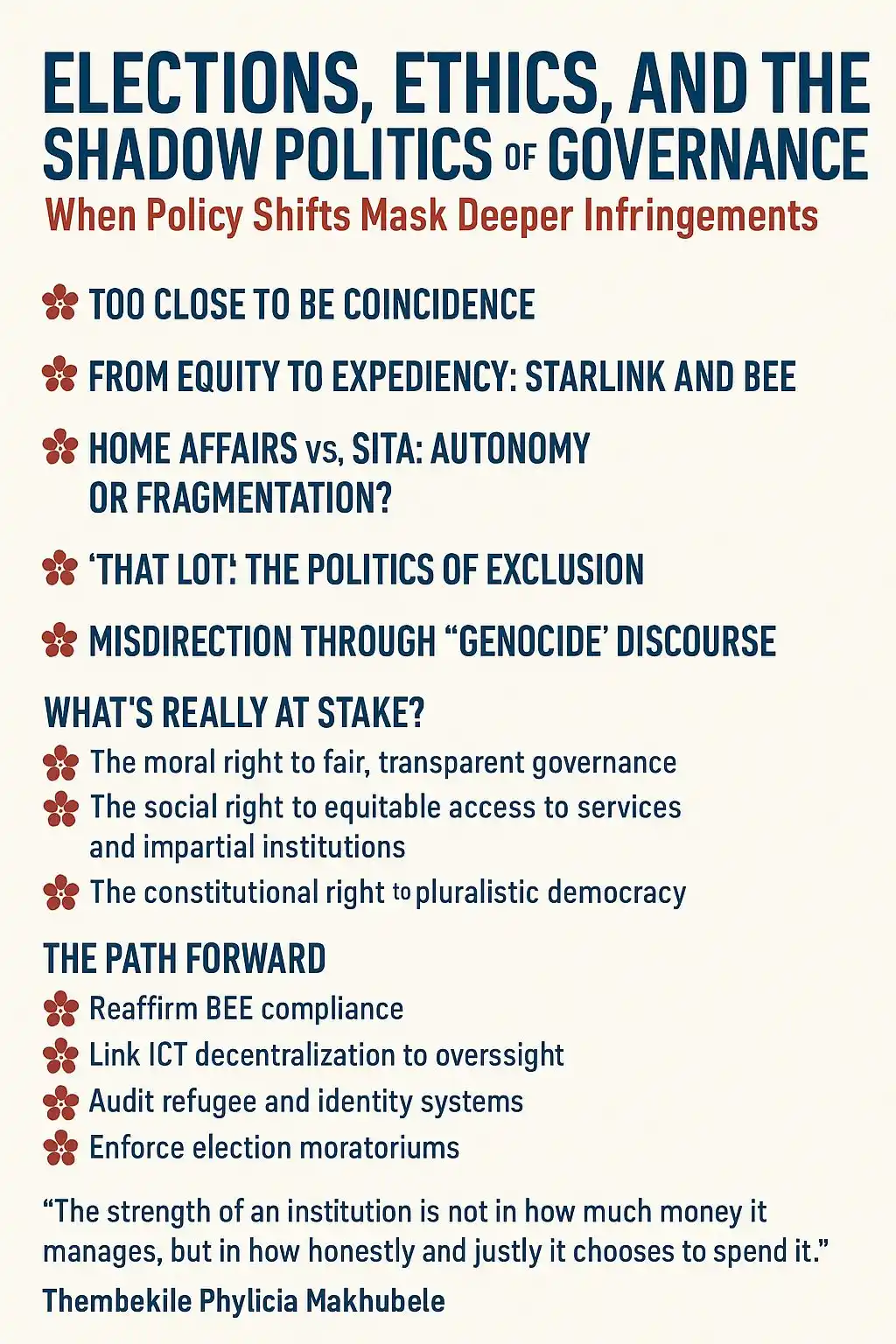
ARE WE TRANSFORMING? with Thembekile Phylicia Makhubele
May 24, 2025 at 12:26 PM
Opinion piece:
ELECTIONS, ETHICS, AND THE SHADOW POLITICS OF GOVERNANCE:
When Policy Shifts Mask Deeper Infringements
Tha past week’s developments just got me thinking that as
South Africa heads toward the 2026 elections, the country finds itself navigating a series of intersecting ethical, political, and administrative puzzles. Policy decisions that seem technical on the surface such as relaxing BEE rules for foreign corporations, granting departments autonomy from centralized ICT governance, or forming a Government of National Unity (GNU) are, in fact, deeply political. They may have long-term implications for both MORAL AND SOCIAL RIGHTS, particularly when institutions appear to be repurposed for electoral advantage(my view).
🌺TOO CLOSE OF A COINCIDENCE:
In the space of weeks, we saw Home Affairs quietly granted authority to bypass SITA oversight, Starlink controversially exempted from BEE obligations, inflammatory rhetoric from GNU leaders about “that lot,” and public discourse hijacked by genocide narratives. These aren’t isolated decisions but they form a strategic pattern of institutional drift, distracting the public while essential oversight systems are being dismantled or politicised. The coincidences are too consistent to ignore, and too critical to dismiss.
If we do not pause to interrogate the ethical cost of these converging moves, we risk walking into a redesigned democratic infrastructure one where power operates through exemption, evasion, and emotional manipulation.
This is my view:
🌺THE SHIFT FROM EQUITY TO EXPEDIENCY: Starlink and BEE
The Communications Department’s willingness to exempt Starlink from BEE’s 30% equity ownership requirement raises pressing moral questions. While the motivation connecting rural areas and improving service delivery is noble, bypassing transformation laws for foreign entities risks eroding the MORAL RIGHTS of historically disadvantaged groups to redress, opportunity, and dignity.
If economic access and participation are rights rooted in constitutional morality, then diluting BEE under the guise of progress is not just a policy decision it’s a MORAL trade-off that privileges expediency over justice.
🌺HOME AFFAIRS vs. SITA: Autonomy or Fragmentation?
Home Affairs’ request to sidestep SITA aims to boost efficiency which has been granted, yet this move suggests a gradual dismantling of centralized oversight. The SOCIAL RIGHT to efficient, equal access to services may be improved, but the risk of siloed, unaccountable procurement practices rises exponentially.
Without unified IT governance, we open the door to fragmented security protocols, corruption in digital service contracts, and possible political capture of state systems, especially TROUBLING IN AN ELECTION YEAR where digital voter systems, ID registrations, and data integrity are crucial.
🌺THE “That Lot” COMMENT: The Politics of Exclusion
When DA leader John Steenhuisen said the GNU’s aim was to “keep that lot out of government,” the undertone was clear, that some parties are deemed too dangerous, too corrupt, or too populist to govern. BUT THE ETHICSL DILEMMA lies in using technocratic or bureaucratic shifts (like the ones described above) to structurally exclude political opponents.
This raises RED FLAGS about institutional neutrality. If governance becomes a chess game of indirect political control via procurement exemptions, media framing, or foreign-backed service deals, it’s not just bad optics, it’s a violation of the MORAL RIGHT to political inclusion and the social right to pluralistic democracy.
🌺MISDIRECTION AND THE “Genocide” DISCOURSE.
At the same time, public discourse is increasingly HIJACKED by polarizing narratives, such as genocide allegations, race-baiting, or identity politics. These are serious issues in their own right, but they can also be weaponized to distract the public from more immediate governance decisions that quietly restructure power.
While the nation is debating emotive ideological battles, administrative ethics are eroded behind the scenes:
🌺Contracts are awarded without due transparency.
🌺Departments gain unchecked procurement powers.
🌺Foreign actors influence service delivery through exemptions.
🌺Policy instruments become partisan tools rather than constitutional mandates.
🌺And with the digitization of critical systems like Home Affairs, the movement or reclassification of “refugees” could easily be manipulated, enabling anyone to triplicate or inflate numbersTURNING 49 into 4,900 votes for a specific party, all while no independent oversight monitors the data trail.
This is how ethical erosion takes place without a headline.
This is how ethical erosion takes place without a headline.
🌺ELECTIONS AND THE MORAL IMPERATIVE OF INSTITUTIONAL TRUST.
As South Africa moves toward the 2026 elections, attention is often drawn to loud political rhetoric and global headlines. But beneath the surface, a quiet set of institutional shifts may pose a greater threat to our democratic soul than any single policy announcement.
What we are witnessing is not just governance under strain. it is ethical architecture being quietly rewritten.
🌺Five signals stand out:
🚨 1. Equity Compromised: Starlink and BEE Exemptions
The decision to exempt Starlink from Black Economic Empowerment (BEE) requirements may seem like a tech-forward move. But what it signals is the selective suspension of equity obligations—creating a dangerous precedent where innovation becomes a loophole, not a shared benefit.
🧩 2. Fragmentation of ICT Governance: Home Affairs Bypassing SITA
The decision to allow Home Affairs to sidestep the State IT Agency (SITA) fragments national ICT governance. What begins as a quest for efficiency may quickly become a breach in ethical firewalling, allowing unchecked procurement, weakened cybersecurity, and politicised data ecosystems.
🏛️ 3. The “That Lot” Remark and Institutional Neutrality
When political leaders state that the Government of National Unity (GNU) was formed to “keep that lot out,” it reveals a dangerous shift: institutions as tools for exclusion. This violates both the spirit and the letter of our constitutional values of impartiality, participation, and pluralism.
📊 4. Inflated Voter Pools & Refugee Reclassification
With refugees and identity data increasingly digitised and centralised, the ability to manipulate voter rolls—intentionally or through oversight gaps—becomes a tangible risk. In the absence of Chapter 9 oversight, how will we know if 49 names become 4,900 strategic voters?
Electronic oversight gaps are no longer technical risks; they are ethical vulnerabilities.
🎭 5. The Distraction Strategy: Genocide Allegations and Moral Evasion
The genocide discourse may be a legitimate international concern but domestically, it serves as a powerful distraction. While the nation debates external atrocities, domestic integrity frameworks are quietly deregulated.
Moral outrage must not become a substitute for local ethical vigilance.
🎯 WHAT IS AT STAKE?
🌺The moral right of citizens to fair, transparent governance.
🌺The social right to equitable access to services and impartial institutions.
🌺The constitutional right to inclusive, representative, and pluralistic democracy.
If South Africa does not interrogate the ethical cost of these converging moves, it risks cementing a system where power operates through exemption, evasion, and emotionally charged distraction. Democratic integrity depends on transparency, not sleight of hand.
Is South Africa at a Crossroads: Ethics, Oversight, and the Quiet Redesign of Democracy?
✅NEED TO:
🌺Is the silent exemption Reaffirming BEE compliance in all tech and telecom agreements.
🌺 ICT decentralisation must comes with equivalent independent oversight.
🌺Audit refugee and identity systems with Chapter 9 institutions before elections.
🌺Policy exemptions or procurement shortcuts during election period- should we be worried?
🌺Institutionalise ethics-based evaluation in procurement, service delivery, and digital platforms.
🧭 In Closing
As we approach the 2026 elections, we are not just choosing leaders, we are choosing the soul of our democracy.
What will define us: power consolidation or constitutional integrity?
Loopholes may deliver short-term wins, but they dismantle long-term trust.
“The strength of an institution is not in how much money it manages, but in how honestly and justly it chooses to spend it.”
It’s time to stop hiding power behind procedures.
Let us rebuild public service and policy around our founding values, not around strategic evasion.
#thembekilesopinion

❤️
🙏
2